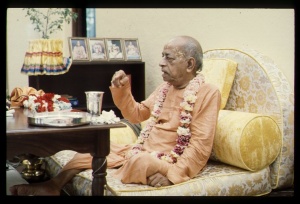SB 10.49.5-6: Difference between revisions
m (1 revision(s)) |
(Vanibot #0054 edit - transform synonyms into clickable links, which search similar occurrences) |
||
| (One intermediate revision by one other user not shown) | |||
| Line 1: | Line 1: | ||
{{info | {{info | ||
|speaker= | |speaker=Śukadeva Gosvāmī | ||
|listener=King | |listener=King Parīkṣit | ||
}} | }} | ||
[[Category:Srimad-Bhagavatam - Canto 10 Chapter 49|s05-06]] | |||
[[Category:Bhagavatam Verses Spoken by Sukadeva Gosvami - Vanisource|104905]] | |||
<div style="float:left">'''[[Srimad-Bhagavatam]] - [[SB 10|Tenth Canto]] - [[SB 10.49: Akrura's Mission in Hastinapura|Chapter 49: Akrūra's Mission in Hastināpura]]'''</div> | |||
<div style="float:right">[[File:Go-previous.png|link=SB 10.49.4]] '''[[SB 10.49.4]] - [[SB 10.49.7]]''' [[File:Go-next.png|link=SB 10.49.7]]</div> | |||
{{RandomImage}} | |||
{{SBnotice}} | |||
==== TEXTS 5-6 ==== | ==== TEXTS 5-6 ==== | ||
<div | <div class="verse"> | ||
teja ojo balaṁ vīryaṁ | :teja ojo balaṁ vīryaṁ | ||
praśrayādīṁś ca sad-guṇān | :praśrayādīṁś ca sad-guṇān | ||
prajānurāgaṁ pārtheṣu | :prajānurāgaṁ pārtheṣu | ||
na sahadbhiś cikīṛṣitam | :na sahadbhiś cikīṛṣitam | ||
kṛtaṁ ca dhārtarāṣṭrair yad | |||
gara-dānādy apeśalam | :kṛtaṁ ca dhārtarāṣṭrair yad | ||
ācakhyau sarvam evāsmai | :gara-dānādy apeśalam | ||
pṛthā vidura eva ca | :ācakhyau sarvam evāsmai | ||
:pṛthā vidura eva ca | |||
</div> | </div> | ||
| Line 21: | Line 27: | ||
==== SYNONYMS ==== | ==== SYNONYMS ==== | ||
<div | <div class="synonyms"> | ||
''[//vanipedia.org/wiki/Special:VaniSearch?s=tejaḥ&tab=syno_o&ds=1 tejaḥ]'' — the influence; ''[//vanipedia.org/wiki/Special:VaniSearch?s=ojaḥ&tab=syno_o&ds=1 ojaḥ]'' — skill; ''[//vanipedia.org/wiki/Special:VaniSearch?s=balam&tab=syno_o&ds=1 balam]'' — strength; ''[//vanipedia.org/wiki/Special:VaniSearch?s=vīryam&tab=syno_o&ds=1 vīryam]'' — bravery; ''[//vanipedia.org/wiki/Special:VaniSearch?s=praśraya&tab=syno_o&ds=1 praśraya]'' — humility; ''[//vanipedia.org/wiki/Special:VaniSearch?s=ādīn&tab=syno_o&ds=1 ādīn]'' — and so on; ''[//vanipedia.org/wiki/Special:VaniSearch?s=ca&tab=syno_o&ds=1 ca]'' — and; ''[//vanipedia.org/wiki/Special:VaniSearch?s=sat&tab=syno_o&ds=1 sat]'' — excellent; ''[//vanipedia.org/wiki/Special:VaniSearch?s=guṇān&tab=syno_o&ds=1 guṇān]'' — qualities; ''[//vanipedia.org/wiki/Special:VaniSearch?s=prajā&tab=syno_o&ds=1 prajā]'' — of the citizens; ''[//vanipedia.org/wiki/Special:VaniSearch?s=anurāgam&tab=syno_o&ds=1 anurāgam]'' — the great affection; ''[//vanipedia.org/wiki/Special:VaniSearch?s=pārtheṣu&tab=syno_o&ds=1 pārtheṣu]'' — for the sons of Pṛthā; ''[//vanipedia.org/wiki/Special:VaniSearch?s=na&tab=syno_o&ds=1 na] [//vanipedia.org/wiki/Special:VaniSearch?s=sahadbhiḥ&tab=syno_o&ds=1 sahadbhiḥ]'' — of those who could not tolerate; ''[//vanipedia.org/wiki/Special:VaniSearch?s=cikīrṣitam&tab=syno_o&ds=1 cikīrṣitam]'' — the intentions; ''[//vanipedia.org/wiki/Special:VaniSearch?s=kṛtam&tab=syno_o&ds=1 kṛtam]'' — had been done; ''[//vanipedia.org/wiki/Special:VaniSearch?s=ca&tab=syno_o&ds=1 ca]'' — also; ''[//vanipedia.org/wiki/Special:VaniSearch?s=dhārtarāṣṭraiḥ&tab=syno_o&ds=1 dhārtarāṣṭraiḥ]'' — by the sons of Dhṛtarāṣṭra; ''[//vanipedia.org/wiki/Special:VaniSearch?s=yat&tab=syno_o&ds=1 yat]'' — what; ''[//vanipedia.org/wiki/Special:VaniSearch?s=gara&tab=syno_o&ds=1 gara]'' — of poison; ''[//vanipedia.org/wiki/Special:VaniSearch?s=dāna&tab=syno_o&ds=1 dāna]'' — the giving; ''[//vanipedia.org/wiki/Special:VaniSearch?s=ādi&tab=syno_o&ds=1 ādi]'' — and so on; ''[//vanipedia.org/wiki/Special:VaniSearch?s=apeśalam&tab=syno_o&ds=1 apeśalam]'' — unbecoming; ''[//vanipedia.org/wiki/Special:VaniSearch?s=ācakhyau&tab=syno_o&ds=1 ācakhyau]'' — told; ''[//vanipedia.org/wiki/Special:VaniSearch?s=sarvam&tab=syno_o&ds=1 sarvam]'' — everything; ''[//vanipedia.org/wiki/Special:VaniSearch?s=eva&tab=syno_o&ds=1 eva]'' — indeed; ''[//vanipedia.org/wiki/Special:VaniSearch?s=asmai&tab=syno_o&ds=1 asmai]'' — to him (Akrūra); ''[//vanipedia.org/wiki/Special:VaniSearch?s=pṛthā&tab=syno_o&ds=1 pṛthā]'' — Kuntī; ''[//vanipedia.org/wiki/Special:VaniSearch?s=viduraḥ&tab=syno_o&ds=1 viduraḥ]'' — Vidura; ''[//vanipedia.org/wiki/Special:VaniSearch?s=eva&tab=syno_o&ds=1 eva] [//vanipedia.org/wiki/Special:VaniSearch?s=ca&tab=syno_o&ds=1 ca]'' — both. | |||
</div> | </div> | ||
{{SBcollapse}} | |||
==== TRANSLATION ==== | ==== TRANSLATION ==== | ||
<div | <div class="translation"> | ||
Kuntī and Vidura described to Akrūra in detail the evil intentions of Dhṛtarāṣṭra's sons, who could not tolerate the great qualities of Kuntī's sons—such as their powerful influence, military skill, physical strength, bravery and humility—or the intense affection the citizens had for them. Kuntī and Vidura also told Akrūra about how the sons of Dhṛtarāṣṭra had tried to poison the Pāṇḍavas and carry out other such plots. | Kuntī and Vidura described to Akrūra in detail the evil intentions of Dhṛtarāṣṭra's sons, who could not tolerate the great qualities of Kuntī's sons—such as their powerful influence, military skill, physical strength, bravery and humility—or the intense affection the citizens had for them. Kuntī and Vidura also told Akrūra about how the sons of Dhṛtarāṣṭra had tried to poison the Pāṇḍavas and carry out other such plots. | ||
</div> | </div> | ||
__NOTOC__ | </div> | ||
</div> | |||
<div style="float:right">[[File:Go-previous.png|link=SB 10.49.4]] '''[[SB 10.49.4]] - [[SB 10.49.7]]''' [[File:Go-next.png|link=SB 10.49.7]]</div> | |||
__NOTOC__ | |||
__NOEDITSECTION__ | |||
Latest revision as of 19:18, 17 February 2024

A.C. Bhaktivedanta Swami Prabhupada
Please note: The synonyms, translation and purport of this verse were composed by disciples of Śrīla Prabhupāda
TEXTS 5-6
- teja ojo balaṁ vīryaṁ
- praśrayādīṁś ca sad-guṇān
- prajānurāgaṁ pārtheṣu
- na sahadbhiś cikīṛṣitam
- kṛtaṁ ca dhārtarāṣṭrair yad
- gara-dānādy apeśalam
- ācakhyau sarvam evāsmai
- pṛthā vidura eva ca
SYNONYMS
tejaḥ — the influence; ojaḥ — skill; balam — strength; vīryam — bravery; praśraya — humility; ādīn — and so on; ca — and; sat — excellent; guṇān — qualities; prajā — of the citizens; anurāgam — the great affection; pārtheṣu — for the sons of Pṛthā; na sahadbhiḥ — of those who could not tolerate; cikīrṣitam — the intentions; kṛtam — had been done; ca — also; dhārtarāṣṭraiḥ — by the sons of Dhṛtarāṣṭra; yat — what; gara — of poison; dāna — the giving; ādi — and so on; apeśalam — unbecoming; ācakhyau — told; sarvam — everything; eva — indeed; asmai — to him (Akrūra); pṛthā — Kuntī; viduraḥ — Vidura; eva ca — both.
Translation and purport composed by disciples of Śrīla Prabhupāda
TRANSLATION
Kuntī and Vidura described to Akrūra in detail the evil intentions of Dhṛtarāṣṭra's sons, who could not tolerate the great qualities of Kuntī's sons—such as their powerful influence, military skill, physical strength, bravery and humility—or the intense affection the citizens had for them. Kuntī and Vidura also told Akrūra about how the sons of Dhṛtarāṣṭra had tried to poison the Pāṇḍavas and carry out other such plots.